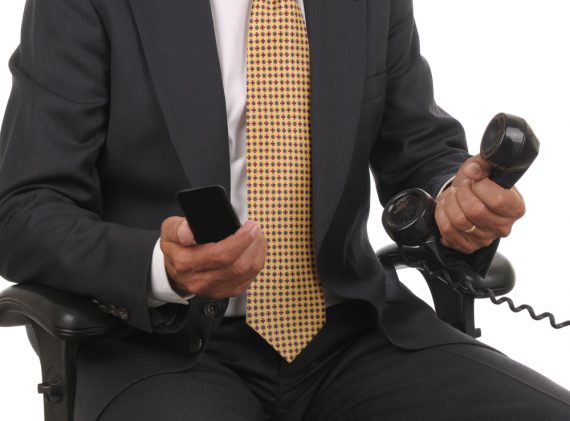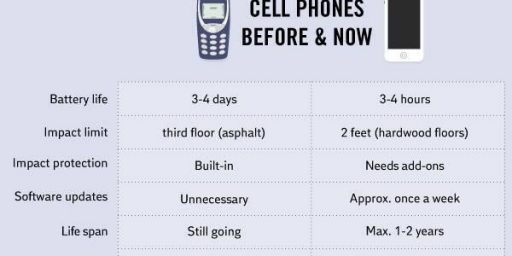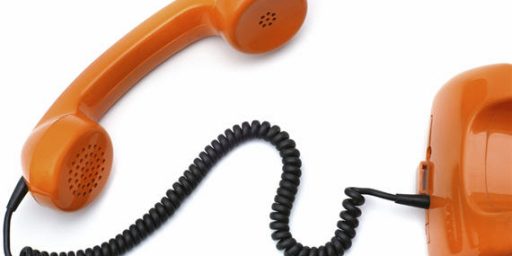Landline Voters v. Cell Phone Voters
An interesting tidbit from the NBC News/Marist polls I wrote about earlier:
Want to see how cell phones make a difference in political surveys? In our NBC-Marist poll of Florida, Romney leads with landline respondents, 48%-45%. But Obama leads among cell phone respondents, 57%-34%. And in Virginia, Romney’s up one among landline folks, 47%-46%, while Obama is up 54%-36% with cell users. (By the way, 28% of our interviews in OH and FL were conducted on cell phone; 27% in VA.)
Andrew Sullivan attributes this to the GOP’s generation gap, and I think that’s probably a large part of it. Younger voters tend to be more supportive of Obama to begin with, and they also tend to be the ones who rely almost entirely, if not completely, on cell phones. Many of them don’t even have a land-line (then again, neither to do I, having gotten rid of land-line phones seven years ago). It also suggests that pollsters will need to start paying more attention to how many cell phone respondents they are contacting. Otherwise, they may not be getting an entirely accurate picture of the electorate.
Seated Businessman Holding Cell Phone And Land-Line image via Shutterstock







How do they get ahold of cell phone numbers? I don’t receive any telemarketing calls on my cell, how does ABC polling get the number?
Not at all surprising. Cell phone users trend a lot younger than land line users and blacks are the only demographic that will vote more in lockstep for Obama than young people. On the other hand, those aged 45 and up are around 54% of the voting electorate and most of the key states to determining the next president, i.e., Fla., OH, PA, WI, IA, have older-than-average demographics.
They’re not getting an accurate picture of the electorate anyways. When a lot people see a polling service calling (or a number that doesn’t identify itself), they don’t answer.
I’m closing in on 40 and I haven’t had a landline for eight years now. I just got my first political poll call on my mobile a couple weeks ago. It was a robocall I hung up on because I was at work. Who decided 9:30 am on a weekday was a good time to poll a cell phone, I have no idea.
Anyway, interesting numbers. As pollsters adjust to the technology reality of today, they should achieve a greater degree of accuracy. However, I still have never seen anyone seriously address what I believe is a bigger problem–the vast majority of people who refuse to participate in a telephone poll when contacted. That percentage has been growing and growing every year, and I don’t believe demographically-focused sampling methods effectively compensate for it.
The refusal rates for polls grow every year, but the response from pollsters is always focused on achieving their quotas instead of worrying about who those refusing to participate are. More refusals, from a pollster perspective, simply mean calling more numbers to get the sample size needed. I have long wondered whether the tendency to refuse to participate may coincide with other attitudes that pollsters are failing to recognize. Perhaps people who aren’t interested in taking a political poll are also less (or more) anti-incumbent than people who are. Perhaps distrust of pollsters coincides with a greater degree of distrust in politicians. One could imagine all kinds of possibilities, but it is near impossible to gauge any of them because we can’t ask the people who refuse to be asked. It is my belief that this problem, to whatever degree it exists now, will only grow.
Pew recently did a study that shows the degree of change in response rates for polls. In 1997, Pew was able to reach an adult 90% of the time, and successfully complete the interview and use it in their sample 36% of the time. After steady decreases in both numbers each year, Pew in 2012 reaches an adult 62% of the time, and successfully completes the interview just 9% of the time.
Pew claims that demographic weighting compensates for the response rate issue:
But they note that the issue does raise at least some questions about the samples achieved:
Even if they are correct that so far demographic weighting provides accurate polling results, I have to believe that will not be true forever. The only viable alternative, Web-based polling, is fraught with much greater problems, at least for now. How much longer will polling give us reliable predictive ability? I don’t think for very long.
I am a 49-year old working class white male without a land line. However, I don’t think I’d pick up if a pollster called me on my cell phone. Also, too, anecdotal!
@mantis:
In my case it’s simple. I would take the polls if there was an offer to pay me for it. Polling companies are large business that make huge amounts of money selling their results to various clients. I’m not interested in donating my labor (and in the case of cell phone polling the cost of being on the phone with them) for free and not getting some of the profit.
@Stormy Dragon:
Note, this is pretty much the same solution I’d make to the issues in the ACS thread: just pay people maybe $10 dollars to complete the form and eliminate the mandatory requirement. Plus, you can then eliminate personally identifying information from the ACS form itself, eliminating the fourth and fifth ammendment issues since you won’t be able to tie a particular set of responses to a particular respondent.
Its not just an age issue. Your more likely to have a landline if you have children. I know people who went from cell phone only to also having a landline after breeding.
On the other hand, if you rent, live in poverty, live in the south, drink more than five alcoholic drinks a day, your probably
a red neckdon’t have a land line.On the other hand, if you rent, live in poverty, live in the south, drink more than five alcoholic drinks a day, your probably
a red neckdon’t have a land line.Interesting. I guess I don’t fit the profile. I’m not “young” in the sense that many non-landliners are, I own a home, am solidly middle class, live in the Midwest, and don’t drink at all. Oh, and I’m married with no kids.
I’d switchover to a cellphone completely if I lived in an area where cell reception was reliable.
If you live in the heart of the San Francisco Bay Area you can get by without a land line, however if you live in any of the areas going out to the coast – in a valley or among the coastal hills – you can’t count on cell coverage.
Every responsible pollster has taken steps to include the cell phone only group in its polls, so if you stick to “name” pollsters (NBC/WSJ is one of the best) this isn’t really any issue. Rasmussen, unfortunately, does not poll cell phone users, which probably helps to explain some of the Republican lean in their polls.
This is why I will continue to disbelieve any and all polls that give me unpleasant results.
Some of these posts beg the question of how these polls are skewed by the type of people that would even take the time to answer a poll.
I imagine there may be a big difference between the views of people that would give up five or ten minutes of their time to talk to a pollster and those that would not. Someone should take a poll to find out…
and now we now the answer to my question of who answers polls: http://www.usatoday.com/news/religion/2010-05-05-prayer05_ST_N.htm
The same type of people that think god answers their prayers.